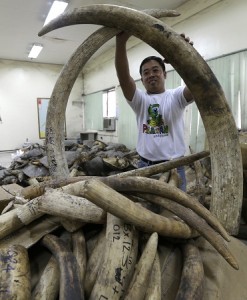Philippines to question priest over ivory trade

A staffer of the Department of Environment and Natural Resources-Protected Areas and Wildlife Bureau (DENR-PAWB) displays elephant tusks which were seized by Philippine customs authorities over a two-year period following failed smuggling attempts in the country, Wednesday September 26, 2012, in Quezon city northeast of Manila. The tusks are to be shipped back to their port of origin, mostly from Tanzania, for destruction. AP/Bullit Marquez
MANILA, Philippines — Philippine authorities will question a Roman Catholic priest about ivory smuggling after his collection of ivory religious icons was featured in National Geographic magazine, an investigator said.
Monsignor Cristobal Garcia, who rose to prominence in a Philippine archdiocese despite a U.S. sex abuse case in the 1980s, is quoted in the October issue of the magazine as describing how to bring ivory figurines into the United States.
National Bureau of Investigation officer Sixto Comia said Wednesday that authorities are investigating the origin of ivory icons widely used in the predominantly Roman Catholic country. He said Garcia will be questioned but declined to give details.
An international ban on trade in ivory and elephant tusks has been in effect since 1990. But poaching for the black market is rife and endangering elephant populations.
Customs officials have intercepted more than 10,000 kilograms (22,000 pounds) of elephant tusks in two separate smuggling attempts in 2005 and 2009. A security guard in a government agency where part of the 4,000 kilograms from the 2009 shipment was stolen is facing criminal charges, Comia said.
Archbishop Jose Palma, President of the Catholic Bishops Conference of the Philippines, said Garcia should be given a “fair and just hearing.”
“The church does not condone ivory smuggling or other illegal activities, although in the past, ivory was one of the materials used in the adornment of liturgical worship,” he said.
Garcia, who is based in Talisay city in Cebu province, is reportedly ill and in a hospital.
He was expelled from the Dominican order in 1986 after he allegedly sexually abused an altar boy in Los Angeles. He remains a priest but Palma said Garcia’s “past” case is being investigated by the Vatican.
In the Philippines’ Archdiocese of Cebu, Garcia founded the Society of the Angel of Peace and is chairman of the Archdiocesan Commission on Worship.
In the National Geographic article, Garcia was quoted suggesting how an ivory figurine of the child Jesus may be smuggled out of the country.
“Wrap it in old, stinky underwear and pour ketchup on it. … This is how it is done,” Garcia was quoted as saying.
The report also said Garcia suggested that a certificate from the National Museum of the Philippines could be obtained to declare a religious image an antique, or an ivory carver could issue a document saying it was made before the ban.
A fellow priest, the Rev. Brian Brigoli, curator of the Cebu Cathedral Museum, said he doesn’t believe Garcia would be involved in illegal trade. He said Garcia’s collection includes donations and those he personally purchased during his travels abroad.
“I know he is very keen on provenance,” Brigoli said of his mentor. “He would not get if there is some question on provenance.”
As a “serious collector” of ivory icons, Garcia “knows a lot about how to smuggle, but he is not the one doing it,” Brigoli said.